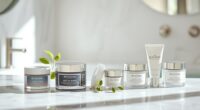Choosing the right sunscreen is essential to shield your baby’s delicate skin from harmful UV rays. Opt for mineral-based options with zinc oxide or titanium dioxide, and ensure it provides broad-spectrum protection with an SPF of at least 30 for babies over six months. Apply it 15 to 30 minutes before sun exposure and reapply every two hours or after swimming. Keeping your baby safe from the sun’s harmful effects is vital, and there’s more to learn about sun safety practices.
Key Takeaways
- Choose mineral sunscreens with zinc oxide or titanium dioxide for effective protection on baby skin.
- Ensure the formula is baby-specific for safety and gentle application.
- Apply sunscreen 15 to 30 minutes before sun exposure to maximize effectiveness.
- Reapply every two hours and after swimming or sweating to maintain protection.
- Dress babies in UPF-rated clothing and use hats for additional sun safety measures.

When it comes to protecting your baby’s delicate skin from the sun, choosing the right sunscreen is essential. You’ll want to opt for mineral sunscreens that contain zinc oxide or titanium dioxide. These ingredients are gentler on sensitive skin and less likely to cause irritation.
Babies are particularly vulnerable to sunburn, so it’s crucial to select a product that provides broad-spectrum protection against both UVA and UVB rays. Look for sunscreens with an SPF of 30 or higher for babies over six months; for those under six months, use SPF 15 to 50 in minimal amounts on exposed areas.
Choose broad-spectrum sunscreens with SPF 30+ for babies over six months, and SPF 15-50 in minimal amounts for those under six months.
Always look for baby-specific or infant-specific formulas to ensure that the ingredients are gentle and safe for your little one. If your baby’s going to be in the water or sweating, choose water-resistant sunscreens to make sure they stay protected longer.
For babies under six months, the best advice is to keep them out of direct sunlight as much as possible. If you can’t avoid it, apply a small amount of sunscreen to any exposed skin, but consult your pediatrician first to ensure it’s appropriate for your baby.
When your baby turns six months, you can start applying sunscreen more liberally to all exposed areas. Apply it 15 to 30 minutes before heading outside, so it has time to absorb properly. Focus on crucial areas like the face, ears, and hands. Remember to reapply every two hours, or immediately after swimming or sweating.
Always be cautious around the eyes and use a clean cloth to wipe away any accidental contact to avoid irritation. Sunscreens containing zinc oxide and/or titanium dioxide are recommended for babies under 6 months to minimize the risk of irritation.
Don’t rely solely on sunscreen for protection. Keep your baby in the shade, especially during peak sun hours from 10 a.m. to 4 p.m. Dress them in lightweight, UPF-rated clothing to cover their arms and legs, and make sure they wear a wide-brimmed hat and sunglasses.
It’s also a good idea to use UV-blocking window shields in the car to minimize exposure while traveling.
Finally, pay attention to your baby’s hydration levels, especially when they’re out in the sun. Look out for signs of dehydration, like fussiness or excessive crying.
Preventing sunburn is crucial for your baby’s long-term skin health, so taking these precautions will go a long way in ensuring their skin remains safe and healthy.
Frequently Asked Questions
At What Age Can I Start Using Sunscreen on My Baby?
You can start using sunscreen on your baby after they turn 6 months old.
Before that, it’s best to avoid it unless absolutely necessary. If you find yourself in a situation without shade, you can apply a small amount of mineral sunscreen to exposed areas like their face and hands.
Always choose gentle, non-absorbing options, and remember to dress your baby in protective clothing and keep them shaded whenever possible.
How Much Sunscreen Should I Apply to My Baby’s Skin?
Imagine a sunny day, with soft rays dancing on your baby’s delicate skin.
When applying sunscreen, for babies under 6 months, use a small dab on exposed areas like the face and hands.
For those over 6 months, slather on about half a shot glass worth to cover all exposed skin evenly.
Remember to reapply every two hours, especially after splashes in the water or a sweaty play session.
Your baby’s comfort matters!
Can Sunscreen Expire, and How Can I Check It?
Yes, sunscreen can expire, typically losing its effectiveness after three years.
To check if yours is still good, look for the expiration date on the packaging. If there’s none, assume it’s valid for about three years from purchase.
You should also inspect the texture, color, and smell for any changes. If in doubt, contact the manufacturer.
Always replace expired sunscreen to ensure you get the best UV protection possible.
Is It Safe to Use Sunscreen on Newborns?
It’s generally not safe to use sunscreen on newborns under 6 months. Their skin is incredibly sensitive and can absorb substances more easily, which could lead to irritation.
Instead, keep your baby shaded and dressed in lightweight, long-sleeved clothing during peak sun hours. Use wide-brimmed hats and stroller canopies for extra protection.
Always consult your pediatrician for the best sun safety tips tailored to your baby’s needs.
Should I Avoid Sunscreen if My Baby Has Sensitive Skin?
Oh sure, let’s just slather your baby in sunscreen and hope for the best!
But seriously, if your little one has sensitive skin, you might want to be cautious. It’s wise to consult your pediatrician before applying any sunscreen.
Look for mineral-based options and do a patch test first.
Conclusion
In conclusion, protecting your baby’s delicate skin with sunscreen is essential for their health and well-being. You wouldn’t want to risk sunburn or long-term damage, right? By choosing a gentle, baby-safe formula and applying it regularly, you can ensure your little one enjoys outdoor adventures without worry. Remember, a little prevention goes a long way in keeping their skin safe from harmful UV rays. So, why not make sunscreen a part of your daily routine?









